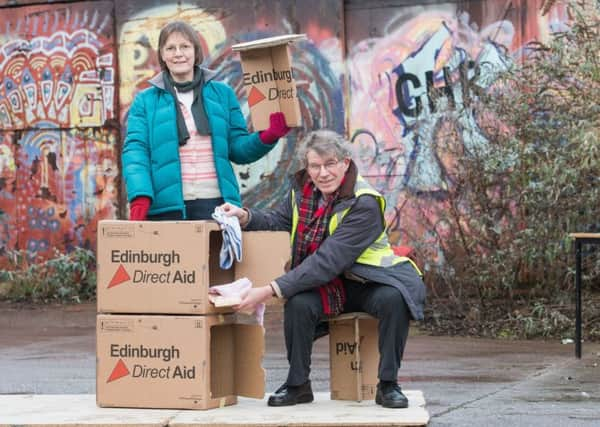Edinburgh charity aid boxes for Syria can be converted into furniture


But the latest shipment of boxes sent from an Edinburgh charity to people living in camps on the Lebanon-Syrian border have a dual purpose – they can be converted into furniture which can be used by the refugees as stools, storage or even school desks.
The donation from Edinburgh Direct Aid (EDA), which is based in the north of the city, will be sent in specially designed boxes which can be cut, folded and made into stackable chests, stools or desks.
Advertisement
Hide AdAdvertisement
Hide AdThe 1,000 boxes of aid containing warm clothes and other essentials will be sent in a ten tonne shipping container from the charity’s Granton warehouse to Syrian refugees in Arsal in Lebanon, on the border with Syria, where the temperatures have dropped to 4C overnight in recent weeks.
EDA said the desks would be used by schools in the camps, which are often informal and set up by volunteers, while the stools will be utilised in the spring when the weather is warmer and people can sit outside their tents. Refugees are also likely to convert the boxes into storage chests for the few belongings they have with them.
Denis Rutovitz, chairman of EDA, said: “This is the first time that we have had anything like this. We are expecting the people living in the tents to find them very useful indeed – they will be pleased to have somewhere to store their things.
“The boxes can be made into stackable cupboards, while another way of using the boxes is to put several together and fold them in a way that you can use them as a school desk.
Advertisement
Hide AdAdvertisement
Hide Ad“Generally, the schools in the camps are not very well resourced and there is a shortage of things like desks.”
The designs were made by packaging company Smurfit Kappa, experts in “second use” of packaging products, which has donated around 10,000 boxes to EDA for use in this and future shipments.
A spokesman for Smurfit Kappa said: “These refugees were forced to flee from their home towns, had terrible experiences and are now living in miserable condition, so we are happy to help in any way we can.”
Thousands of Syrian refugees have been living in makeshift camps on the Lebanon border since the outbreak of war in their homeland in 2010. Earlier this year, around 10,000 people were sent back to Syria, largely under agreements negotiated by Hezbollah, in the largest repatriation of refugees since the war began.
Advertisement
Hide AdAdvertisement
Hide AdIn total around five million Syrians are believed to have been displaced from their homes into the neighbouring nations of Lebanon, Jordan and Turkey, with around 1.5 million of those in Lebanon.
A recent Human Rights Watch visit to Arsal found widespread lack of legal residency, restrictions on freedom of movement, and fear of seemingly random arrests during army raids. Aid groups estimate that between 70 to 80 per cent of the estimated 1.5 million Syrian refugees in Lebanon lack legal status.
The mountainous town of Arsal, which is now home to around 60,000 Syrians alongside a population of 38,000 Lebanese, is higher and therefore often colder than other places in the region.
The EDA aid shipment is due to leave Edinburgh today.